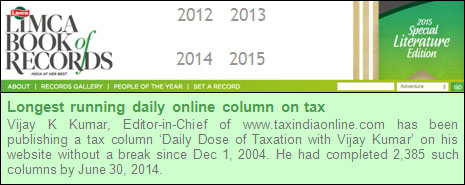 TIOL-DDT 2821 TIOL-DDT 2821
06 04 2016
Wednesday
PRESIDENT of the Tribunal Justice Goda Raghuram retired on 3rd March 2016 and since then, there is no President and the work in CESTAT has virtually come to a standstill or will soon.
As per Section 129(1) of the Customs Act, The Central Government shall constitute an Appellate Tribunal to be called the Customs, Excise and Service Tax Appellate Tribunal consisting of as many judicial and technical members as it thinks fit to exercise the powers and discharge the functions conferred on the Appellate Tribunal by this Act.
As per Section 129C(1), The powers and functions of the Appellate Tribunal may be exercised and discharged by Benches constituted by the President from amongst the members thereof.
As per Section 129(5), A Vice-President shall exercise such of the powers and perform such of the functions of the President as may be delegated to him by the President by a general or special order in writing.
Now there is a sort of constitutional crisis in the CESTAT.
Only the President can constitute the Benches (Roster). A Vice-President can exercise such powers as may be delegated by the President. There is no Vice-President for the Tribunal and of course as of now no President. So there is nobody to constitute the benches. Some new Members have joined but they cannot sit in the Benches in the absence of a roster by the President. Only those Benches constituted by Justice Raghuram before his retirement can function.
A sad state for a tribunal with over a lakh of cases pending to see Members sitting idle for want of a roster and a President.
See how badly the law was drafted. The Vice-President can exercise only those powers which the President delegates. What will happen if the President suddenly dies or becomes sick without bothering to delegate some of those powers to the Vice-President? And what happens if the President dies, falls sick or retires, when there is no Vice-President? And what would happen if the duly delegated Vice-President dies, retires, resigns or falls sick? The Vice-President does not have the power to delegate. No doubt, they can always have more than one Vice President.
They could have simply made a provision to appoint the senior-most Member as Acting President till a regular President joins. It appears now they don't want to make the senior-most Member even as the Head of the Department.
There is another problem. Anti Dumping Appeals can be heard only by a Special Bench constituted by the President of the Appellate Tribunal and such Bench shall consist of the President and not less than two members and shall include one judicial member and one technical member.
Any way the present position is that no Bench can be constituted, let alone a special bench for anti dumping appeals.
The Government knew three years ago that Justice Raghuram would retire in March 2016. Couldn't they find a successor much before his retirement? In fact, it would be better to appoint the prospective President as Vice-President three months before the retirement of the President; allow him to have a feel of the Tribunal and then he can take over when the President retires.
Ravindran is HoD of CESTAT
Mr. MV Ravindran, Member (Judicial) is declared as Head of Department for the CESTAT till a regular President joins or till further orders, whichever is earlier. It is specifically mentioned that he will not transfer Members of the Tribunal.
Department of Revenue F.No. A-12026/02/2011-Ad.IC (CESTAT)., Dated March 31, 2016
Provisional Assessments Finalisation - Board Wants Quick Action
THE CAG had adversely commented on the large number of Provisional Assessments in Central Excise pending for years together and this matter is also taken up by the Public Accounts Committee of Parliament.
Normally no officer in the department would take the risk of finalizing the provisional assessment - that is the only assessment by them.
The Board has decided that delay in finalization of provisional assessment cases should be reviewed by the Commissioners on monthly basis with reference to number of pendencies and their disposal, issue involved and amount of differential duty in respect of each assessee and should also be reflected in their monthly report.
Board wants all the pending provisional assessment cases to be disposed of within six months.
Board wants that the jurisdictional Commissioner should ensure that normally no provisional assessment case should remain pending beyond 1 year. To convey this, the Board instruction says, "The jurisdictional Commissioner should be ensured that normally no provisional assessment case should remain pending beyond 1 year." So much for clarity in Board instructions - how do you ensure a Commissioner?
Board further desires that for keeping pendency of provisional assessment cases at their minimum level, efforts should be made to encourage the assessee to pay the duty on clearance of goods and go for final assessment.
Who bothers?
In 1998, by Circular No. 382/15/98-CX, dated 19th March 1998, the Board emphatically told the field officers, "All cases of Provisional Assessment must be finalised within a period of 6 months from the date of issue of the order of Provisional Assessment.".
After eighteen years of callous disobedience by the field, Board is telling them the same words. It seems there are provisional assessments pending for more than thirty years!
CBEC Instructions in F.No.238/11/2014-CX-7., Dated March 30, 2016
Review of Grievances by Senior Officers - CBDT Instructions
DURING the PRAGATI meeting on 27.01.2016, the Prime Minister reviewed the disposal of grievances relating to the Central Board of Excise & Customs. During the interaction, the PM, inter alia, desired that: 'Secretaries of all Departments having substantial public dealing should personally examine 10 grievances every week and Addl. Secretary/CMD rank and Joint Secretary level officers should examine 20 and 30 grievances respectively every week.
During the recent PRAGATI interaction on 23.03.2016 also, the PM reiterated that for timely and proper resolution of public grievances, higher level monitoring of public grievances is necessary.
Accordingly it has been decided that all the Members of CBDT and all the Pr.CCsIT/Pr. DGsIT will personally examine 10 CPGRAMS grievances every week. Similarly, all the CCsIT and Pr.CsIT/CsIT will personally examine 20 and 30 CPGRAMS grievances respectively every week. A monthly report about such monitoring of grievances will be forwarded to the Zonal Members by the Pr.CsIT/Pr.DGsIT by 5th of succeeding month. All the Members of the Board will, in turn, forward a consolidated report to Chairman for submission to the Secretary, Revenue for onward transmission to the PMO/DARPG.
CBDT OM in F.No. Dir(Hq.)/Ch(DT)/39(2)/2015., Dated April 04, 2016
RTI - Several CBEC Zones are defaulters in submitting Reports to CIC
EVERY Public Authority has to submit four quarterly returns for assessment of their performance during a year under the RTI Act to the CIC. Any Public Authority, which fails to submit their return even for a single quarter, is treated as defaulter for this purpose.
In the Annual Report of the Commission for 2014-15, it is mentioned that the following Chief Commissioners have not filed their returns:
1. Central Excise, Cochin
2. Central Excise and Customs, Pune
3. Central Excise and Customs, Nagpur
4. Central Excise and Customs, Vadodara
5. Central Excise and Customs, Visakhapatnam
6. Central Excise and Customs, Bhopal
7. Central Excise and Customs, Meerut
8. Customs Preventive, Delhi
9. Customs, Ahmedabad
10. Customs, Bangalore
11. Customs, Chennai
12. Customs, Mumbai-II
13. Customs, Mumbai-III
14. Customs, Patna
15. LTU, Bangalore
Several Income Tax Chief Commissioners also figure in the list.
Will these officers keep quiet if their assessees don't file returns? To command is to obey.
Govt Employees may get Child Care Leave for Travelling with Children
A DoPT OM states, "The underlying intent of CCL (Child Care Leave) is to allow care of up to two children whether for rearing or to look after any of their needs like examination, sickness etc. Thus, it is not restricted to exam and sickness alone. Taking care may also include ensuring their rest and recreation and towards that objective leaving headquarters or availing LTC can be allowed. It is thus proposed that the employees may be permitted to leave headquarters/avail LTC while they are on CCL.
Leave for surrogate mothers: There is no provision at present for any kind of Leave for surrogate/commissioning mothers. It is proposed that 180 days maternity leave may be granted to the surrogate as well as commissioning mothers, in case either/both of them are Government servants. The commissioning mother also requires time for bonding with her child and to take care of him/her and hence would also become eligible for Child Care Leave. Paternity Leave may also be granted in case of surrogacy.
These are only proposals now but are sure to be accepted.
DoPT Office Memorandum in No. 13018/1/2014-Estt(L)., Dated April 01, 2016
7th Pay Commission and Service Tax effect on inflation - RBI
THE Reserve bank of India in its Monetary Policy Statement, 2016-17, states:
Excluding petrol and diesel from this category, inflation stayed elevated and persistent at or above 5 per cent, indicating a possible resistance level for further downward movements in the headline. The stubborn underlying inflation momentum is unlikely to be helped by the 7th Pay Commission award and the effects of the one-rank-one-pension (OROP) award, or by the cost-push effect of the increase in the service tax rate.
The persistence of inflation in certain services warrants watching, while the implementation of the 7th Central Pay Commission awards will impart an upside to the baseline through direct and indirect effects.
The uneven recovery in growth in 2015-16 is likely to strengthen gradually into 2016-17, assuming a normal monsoon, the likely boost to consumption demand from the implementation of the 7th Pay Commission recommendations and OROP, and continuing monetary policy accommodation.
Until Tomorrow with more DDT
Have a nice day.
Mail your comments to vijaywrite@tiol.in |









 Download PDF
Download PDF




